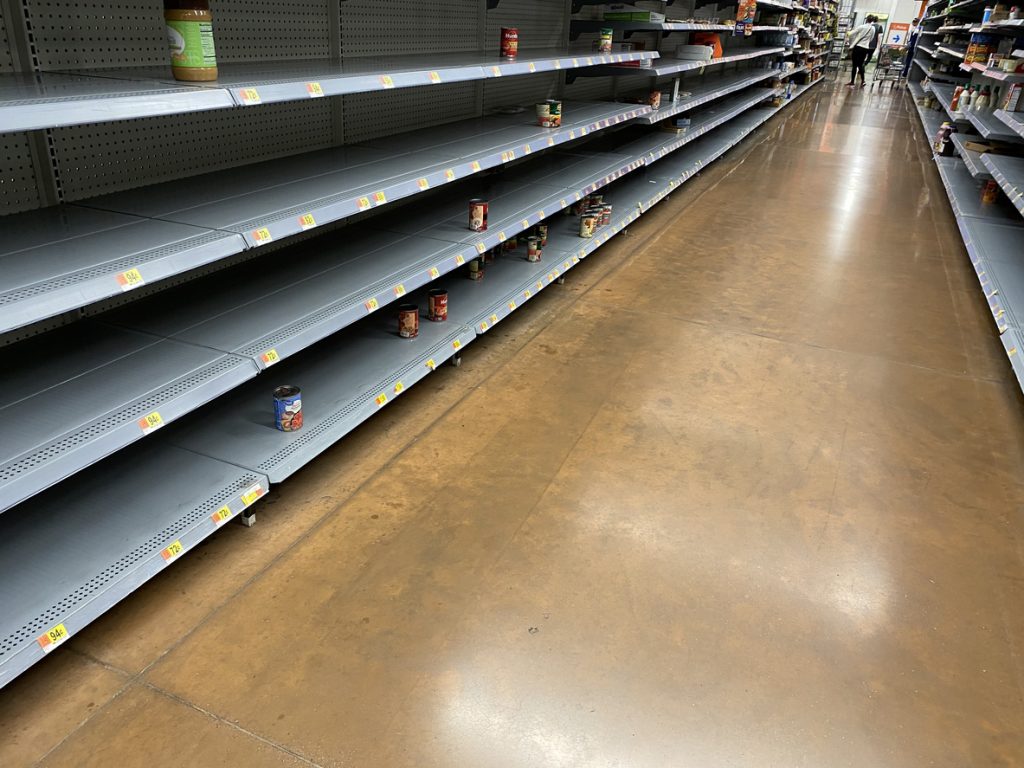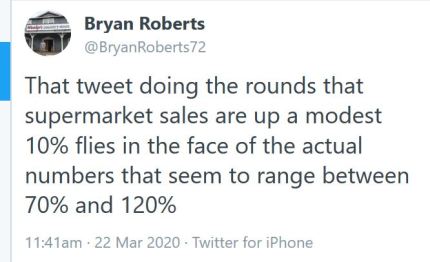Professor Leigh Sparks, Professor of Retail Studies, Institute for Retail Studies, Stirling Management School

Three weeks later and the world we were discussing has been turned upside down. The last time I saw Helen, she was presenting about a different retail crisis, live on TV, as one of the three speakers at the Prime Minister’s daily National Coronavirus press briefing.
As everyone is all too aware, retailing is in the eye of the Covid19 storm. My last post, on this topic, has stood up reasonably well, but failed totally to predict the scale of panic-buying in grocery stores. Supermarkets have been struggling to cope with the surge in demand and have embarked on a massive temporary hiring spree to try to ensure supply. Supposedly mundane unimportant jobs, such as shelf fillers, have now been reclassified as national key workers.
There are some commentators laying the blame for the empty shelves on the supermarkets’ systems of supply, claiming they have failed to cope with a 10% increase in demand. This figure is wrong, calculated on a smoothed annual figure; demand has shot up by much more than this, with a consensus of c70%.

The fault is not with the supermarkets but with the consumer surge in demand, in a short time and without any warning or planning. Some of this buying is understandable – if you are going to be at home for weeks, then you need supplies – but some is clearly panic and/or attempts at personal profiteering. There seems to be supply of much (not all) product in the system as a whole, but the issue is keeping the shelves supplied and filled. With stores having limited storage space and regular (JIT) supply, the spikes in demand have overwhelmed the processes. If the stores can be resupplied and consumers act more responsibly then there is not anywhere near the problem people are imagining.
Some sense of order is being developed. The reduced opening hours, the social distancing, special shopping for NHS and other priority groups, additional hiring and capacity building (including restaurant and other operators switching production) will all help. As restaurants, pubs and cafes close though so the out of home trade will decline and add to the pressure on supermarkets. There is much to be done to get supply right, but despite the scenes of empty shelves and long queues, the food retailers, their staff and suppliers are dong a great job in very difficult circumstances.
Another component of the sector – the convenience and independent local stores – also seem to have been playing their part. Supply may have been less of a problem it seems in bits of this sector, but it is the community and local nature of the stores and their owners that has come to the fore. Stories abound of local retailers serving the elderly, vulnerable and so on and supporting a wide range of
local initiatives. This localness will become ever more important.
Again though the issue may not be the overall supply of the product, but unpredictable demand. We made it out to our local butchers and fishmongers at the weekend and they told stories of quadrupling of sales and their inability to keep product in the stores. This is not a lack of overall supply, but demand outstripping imagination. How as a local butcher do you imagine and cope for a four fold increase in sales overnight? These are massive oscillations in supply which hopefully will level out in due course.
A final food related thought. Food banks have been going through a tough time and donations are much needed. The Co-operative’s national gesture (amongst lots of great initiatives by a range of retailers on a range of topics) will help, but supporting food banks at this time will be a lifeline for vulnerable people. If you can help, please do.

Food retailing has seen the worst and the best of behaviours over this past couple of weeks. It is going through quite a bizarre period and an Armageddon from an unexpected origin. What the shape of all this will look like at the end, who knows. We may well find that retailers and policy makers will need to take a hard look at the way we operate our food system in the future. Consumers are unlikely to forget those that help them at this time.
Non-food retailing is another matter though, and I’ll turn to that in a further post.
This post first appeared on the Stirling retail blog on 23 March 2020.
